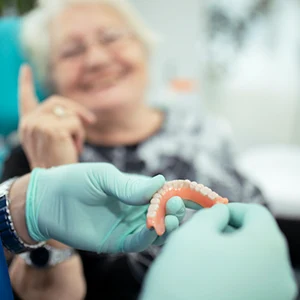Dentures are a widely used restorative option for individuals experiencing partial or complete tooth loss. But like any medical device, dentures are not permanent. So, how long do dentures last? At Center For Dental Implants, we provide evidence-based guidance and personalized care to help patients maintain optimal oral health with or without natural teeth.
Average Lifespan of Dentures
The typical lifespan of dentures varies based on their type, material, and maintenance:
- Full Dentures: 5–10 years
- Partial Dentures: 10–15 years
- Implant-Supported Dentures: 15–20+ years (with proper care and maintenance)
These averages are supported by clinical experience and findings published by institutions such as the American College of Prosthodontists, which notes that anatomical changes in the oral cavity necessitate replacements or relines over time.
Why Dentures Need Replacement Over Time
Dentures must be periodically adjusted or replaced due to changes in the oral structure and wear of the prosthesis. Below are clinically supported reasons why dentures have a limited lifespan:
1. Physiological Bone Resorption
Once natural teeth are lost, the underlying jawbone begins to resorb or shrink. This ongoing process can change the way dentures fit, resulting in discomfort or instability.
2. Material Degradation
Despite advances in denture materials, acrylic and resin teeth still degrade over time. Normal chewing and speaking create wear, which may alter bite and function.
3. Oral Tissue Changes
Age-related gum shrinkage, health conditions like diabetes, and medication side effects can all affect denture fit and comfort.
4. Hygiene and Maintenance
Dentures exposed to poor cleaning habits may harbor bacteria and fungi, leading to oral infections like denture stomatitis. Staining and structural damage are also more likely without proper care.
Types of Dentures and Their Longevity
Understanding the various denture types can help set realistic expectations for durability:
Conventional Full Dentures
These replace all teeth in the upper or lower jaw. With regular dental check-ups and relines, they last about 5 to 10 years.
Partial Dentures
These are designed to replace multiple missing teeth, anchoring onto remaining natural teeth. They often last 10 to 15 years, provided adjacent teeth remain healthy.
Immediate Dentures
These temporary prosthetics are placed right after extraction. While useful during healing, they are generally replaced within 6–12 months.
Implant-Supported Dentures
Backed by dental implants placed in the jawbone, these dentures offer superior fit, function, and longevity, lasting 15 to 20+ years, although the denture portion may still require replacement over time.
Clinical Signs You May Need New Dentures
Dental professionals advise monitoring the following indicators of wear or poor fit:
- Persistent oral discomfort or sores
- Difficulty chewing or speaking
- Frequent slippage or looseness
- Visible cracks, staining, or discoloration
- Changes in facial appearance (e.g., sagging lips or cheeks)
If any of these signs are present, schedule a comprehensive evaluation at Center For Dental Implants. Continued use of poorly fitting dentures can accelerate bone loss and increase infection risk.
Expert Tips to Extend Denture Life
Our clinical team emphasizes the following denture care practices to ensure longevity and optimal function:
Daily Cleaning Routine
Use a denture brush and non-abrasive cleanser. Avoid regular toothpaste, which can scratch the surface and promote bacterial buildup.
Safe Storage
Always store dentures in clean water or a dentist-recommended soaking solution overnight to prevent warping and drying out.
Regular Dental Checkups
Visit your dentist at least once a year—or sooner if you notice changes. Relines or adjustments may extend usability and maintain oral health.
Avoid DIY Repairs
Professional repair and relining services are essential for maintaining denture integrity. Avoid glue or at-home kits.
Protect Against Damage
Dentures should be handled carefully and cleaned over a soft surface or towel to prevent breakage.
Dentures vs. Implants: Longevity Comparison
Although traditional dentures offer affordability and non-invasive fitting, implant-supported dentures offer a longer-lasting and more secure solution.
- Dental Implants can last 25+ years with good oral hygiene and follow-up care.
- The denture component may need replacement every 15–20 years, depending on wear.
Implant options reduce the risk of jawbone loss and often eliminate the need for adhesives or relining, making them an ideal solution for long-term tooth replacement.
The Role of Denture Relining and Adjustments
You don’t always need a full replacement. In many cases, denture discomfort or looseness can be corrected with a reline:
- Soft Reline: Adds a cushioning layer for patients with sensitive gums.
- Hard Reline: Involves reshaping the internal base to match gum changes.
Relining enhances comfort and extends denture life. However, it’s only effective if the denture base is structurally intact.
Conclusion: How Long Do Dentures Last?
Dentures are a reliable solution, but they come with a finite lifespan. Most patients will need replacements, adjustments, or relines over time. On average:
- Full dentures: 5–10 years
- Partial dentures: 10–15 years
- Implant-supported dentures: 15–20+ years
At Center For Dental Implants, we combine advanced technology with clinical experience to offer custom-fit, long-lasting dentures that support your lifestyle and confidence.
Ready for a Denture Evaluation?
Contact Center For Dental Implants to schedule your personalized denture consultation.
FAQs
Can dentures last longer than 10 years?
Yes, particularly partial or implant-supported dentures. However, relines and maintenance are often required beyond the 5–10 year mark for full conventional dentures.
Are there health risks in using old dentures?
Yes. Poorly fitting dentures can cause sores, fungal infections, speech issues, and even accelerate bone resorption.
How often should dentures be relined?
Most dentures require relining every 2–3 years, but this varies depending on the patient’s gum and bone changes.
What is the best denture cleaning method?
Use a soft brush and non-abrasive denture cleanser. Avoid hot water, bleach, or standard toothpaste. Soak overnight in a professional cleaning solution.
Should I sleep with my dentures in?
No. Removing dentures at night allows gum tissues to rest, reduces risk of infection, and preserves oral health.
Bibliography and Sources
- https://www.gotoapro.org/faq/how-long-should-dentures-last/
- https://www.mayoclinic.org/healthy-lifestyle/adult-health/in-depth/dentures/art-20047420
- https://www.nidcr.nih.gov/research/data-statistics/tooth-loss
- https://doi.org/10.1067/mpr.2000.107784
- https://www.ncbi.nlm.nih.gov/pmc/articles/PMC6161450/


